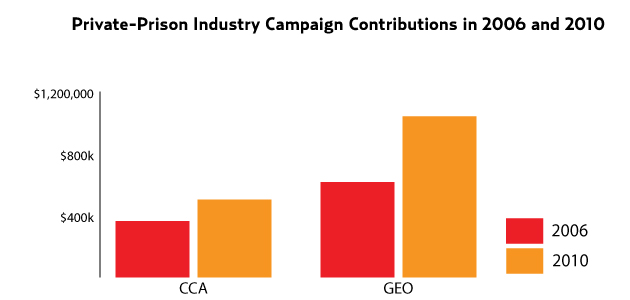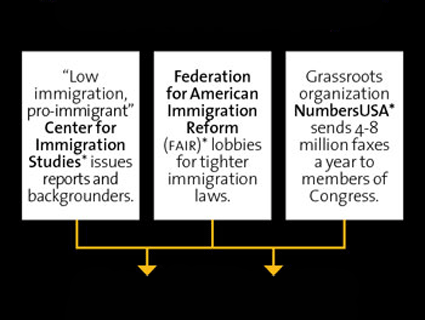To get a better sense of the legislative push that most famously included Arizona’s draconian SB 1070, Mother Jones built a database of the 164 (often curiously similar) anti-immigration laws passed by state legislatures in 2010 and 2011. As you can see below, the number of restrictive laws jumped last year, when five states—Alabama, Georgia, Indiana, South Carolina, and Utah—passed Arizona-style bills. For a state-by-state look at these copycat laws, undocumented population demographics, political contributions from the private-prison industry, and more, scroll down the page. See our sources and dive into the full database below.

Just how wide-ranging has the recent anti-immigration push been? Only seven states (Alaska, Connecticut, Delaware, New Hampshire, Ohio, Wisconsin, and Wyoming) failed to pass anti-immigration laws in 2010 and 2011. Most states passed anywhere from 1 to 6 such bills—on everything from driver’s license eligibility to the mandatory use of E-Verify—while a few (Arizona, Utah, and Virginia) passed 11 or more. Including Arizona’s SB 1070, 36 states considered wide-ranging anti-immigration laws; 6 were successful.
Anti-Immigration Laws Passed, 2010-11

Laws That Copycat Arizona’s SB 1070

TRACKING THE UNDOCUMENTED
It’s no surprise that many undocumented immigrants reside in border states like Arizona, California, and Texas (or in longtime immigrant havens like Florida and New York). But 2010 estimates by the Pew Hispanic Center show that immigrants account for more than 2 percent of the population in the Pacific Northwest, parts of the Plains, and several Southern states. And as many as 25 states—most in the middle of the country—may have seen increases in the percentage of undocumented immigrants from 2005 to 2010.*
Estimated Percentage of the Population That Is Undocumented, 2010

Estimated Change in the Percentage That Is Undocumented, 2005-10

STANDING TO BENEFIT?
Back in 2010, NPR reported on the financial stake private-prison companies like Corrections Corporation of America and the GEO Group have in the passage of state immigration laws. As former GEO Group president Wayne Calabrese said on a May 2010 call with investors, “Those people coming across the border and getting caught are going to have to be detained, and that for me, at least I think, there’s going to be enhanced opportunities for what we do.”
2010 Campaign Contributions from Private-Prison Industry


STILL DREAMING
Not all immigration-related laws at the state level are restrictive. Fourteen states, including Texas under Gov. Rick Perry, have passed so-called state DREAM acts, legislation allowing undocumented students to qualify for in-state college tuition. Five have passed bills to keep such students from qualifying (effectively charging them out-of-state or even international tuition), including Arizona and three other states (Georgia, Indiana, and South Carolina) that passed SB 1070-like laws.
Laws on In-State Tuition for Undocumented Students

Correction: The original version of the in-state tuition map showed Wisconsin as granting in-state tuition to undocumented immigrants. In fact, the Wisconsin Legislature passed a bill last year repealing that earlier legislation. The map has been changed to reflect this.
*It is important to note that the Pew Hispanic Center study expressed its data in ranges, which reflect significant margins of error. When comparing 2007 and 2010 data, for example, coauthor D’Vera Cohn said that researchers could say with confidence that the numbers went up or down only in four states (and two other groups of states).
![]() Want more data? Check out our one-of-a-kind database, the most comprehensive roundup of state immigration laws publicly available.
Want more data? Check out our one-of-a-kind database, the most comprehensive roundup of state immigration laws publicly available.
Additional reporting by Hamed Aleaziz. Sources: eLobbyist.com, National Conference of State Legislatures, National Council of La Raza, National Institute on Money in State Politics, Pew Hispanic Center, US Census Bureau.
















